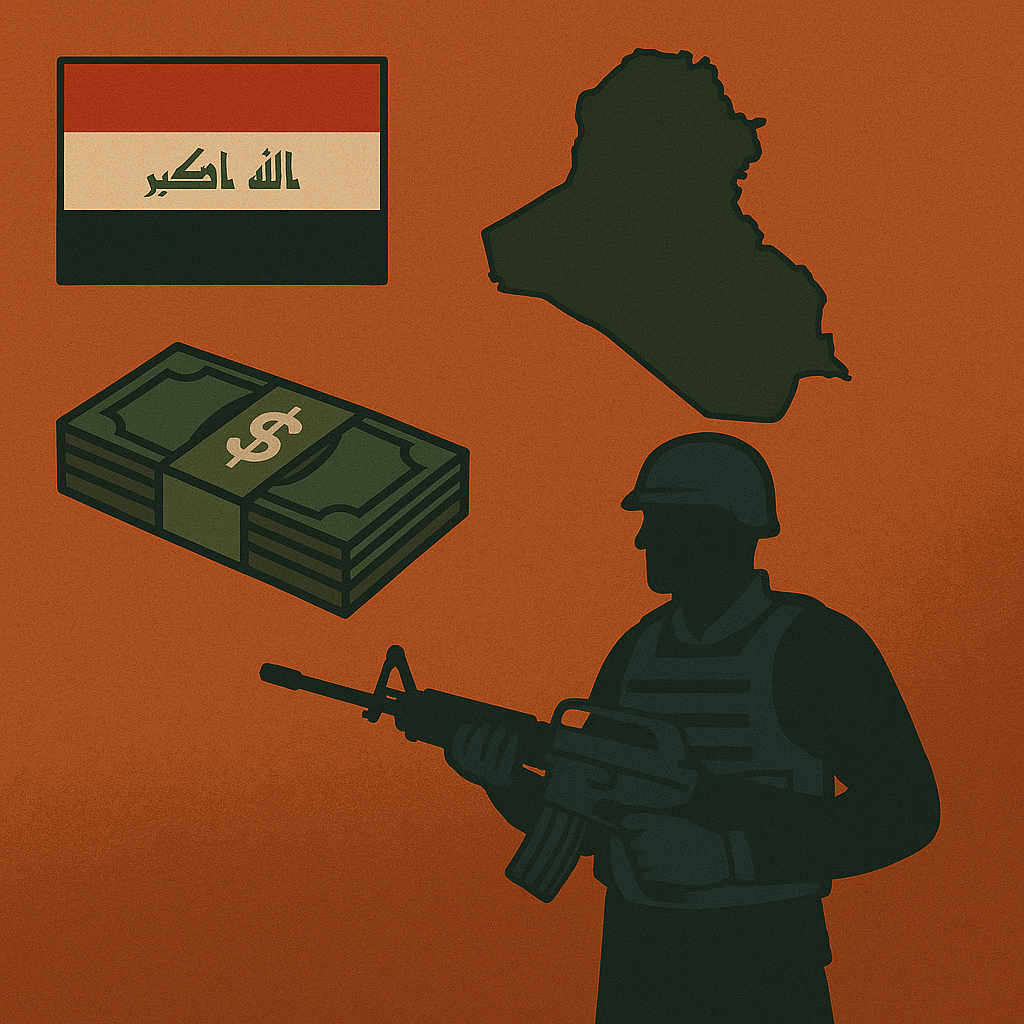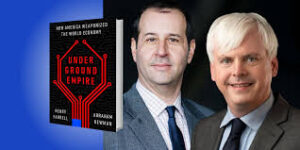The Political Economy of War; The Iraq War (2003) & The Rise of Private Military Contractors

The Iraq War (2003) and the rise of private military contractors highlight the intersection of conflict, security, and profit.
Abstract:
The political economy of war sheds light on the concept that how warfare is spurred by economic incentives and structures in addition to political disputes. Keeping in view the horrific incident of the 2003 Iraq conflict as a case study, this paper sheds light on the interdependence on conflict and the economy, taking note on the extraordinary growth of private military contractors (PMCs). The research examines how warfare has evolved into a hybrid field where state goals and private profit incentives are entwined using a qualitative political economics approach.
According to the study, the Iraq War demonstrates a change in the nature of contemporary warfare: although conflicts destroy communities, they also present profitable chances for private companies engaged in resource management, security, and rebuilding. The proliferation of PMCs during and after the Iraq War illustrates an overhaul of state power, with the dominance over violence mostly transferred to market actors. This essay argues that, in addition to altering the nature of military engagement, such privatization has long-term implications for sovereignty, accountability, and international security. By framing the Iraq War within the broader context of political economics, the research highlights how economic imperatives increasingly influence the conduct and results of contemporary conflicts.
Key words: Economy, Conflict, PMCs, Global sovereignty, Militarization of economy.
- Introduction
The political economy of warfare is an expression explaining that how monetary objectives, political choices, institutional power flows commune through warfare. It evaluates that how wars are financed, who reaps the benefits, how resources are split up and handled during confrontations, and how economic considerations frequently drive or influence war-related political choices. The major aspect of political economy of warfare of any state is war financing that how states or certain groups provide monetary assistance to wage the war on a larger scale.
One of the tactics used by the states is taxation, in some cases to offset the cost of military activities, governments may impose war-specific levies or tariffs or increase taxes. Taxation in some instances put to use as a patriotic commitment to encourage the populace to support the war activities. Moreover, strategic allies help states in terms of finance, logistics, technology and man power to wage war to achieve their interest like USA made a strategic alliance named NATO to counter USSR back in cold war era.
If delve deeper in to the historical shelf of warfare, then Iraq war 2003 serves as the crucial case study to understand the concept of political economy of warfare particularly when glanced through the prism of privatization and emergence of private military cooperation (PMCs).
In past times, war has been themed around with economic goals, often presenting as a medium for economic restructuring, profit-making, and resource control. Following the U.S.-led invasion of Iraq, policies that prioritized economic liberalization and privatization were implemented. The Coalition Provisional Authority (CPA) leader, L. Paul Bremer, officially stipulated Iraq “open for business” in May 2003, marking the commencement of major transformations that privatized state-owned businesses and welcomed international investment into the country’s economy. The endpoint of these reforms was to rebuild Iraq’s economy, nevertheless they increased instability by tearing down legal structures and leaving a vacuum that was occupied by militias and unofficial networks (Parker & Moore, 2007).
The outsourcing of military activities was just one aspect of the commercialization of war that went beyond Iraq’s internal economy. Throughout the conflict, PMCs were essential to combat operations, security, and supplies. Their participation signaled a change in contemporary warfare from military under state control to for-profit businesses (Singer, 2005).
1.2 The Political Economy of War: Theoretical Framework
The political economics of war analyzes the analogy between economic interests and war, showcases the influence of corporate power, neoliberal policies, and profit-driven conflicts. This notion sheds light that how war is a business, with financial gains usually eclipse humanitarian concerns.
For governments, businesses, and the defense sector, war has always been a profitable enterprise. The idea of “warpreneurship” demonstrates how businesses make money from ongoing hostilities as well as rehabilitation efforts following a conflict. Defense contractors and private companies that provide armaments, supplies, and services to military throughout the world are prime examples of this profit-driven strategy (Mutonyi, 2021). The trend of investing in war is not new. It dates back from the cold war era when massive amount of purchase in military sectors have been fueled by the Cold war weapons race between USA and USSR. Firms notably Boeing and Lockheed Martin rose to prominence and flourished through producing advance weapons and ammunition with government contracts to uphold military dominance for their own economic gains (Cypher,2022) .
Another case history on historical shelf included the Gulf War that ended up to be the prime illustration that how conflicts undermine international markets. Moreover, fluctuations in oil price provided the room to American oil corporations to generate revenue overseas, an increase in U.S. defense spending boosted home demand.Allies’ contributions further reduced American expenses, demonstrating how war may assist some industries economically (Throop, 1991).
Back in times President Dwight Eisenhower’s coined a term military-industrial complex has become a global network of governing bodies and corporate defense businesses that are linked with contemporary conflicts. Firms notably, Raytheon and BAE Systems who create state-of-the-art technologies as well as champion the rules and legislation that prolongs the conflicts For example, in 2022, global military spending reached $2.24 trillion, with substantial portions allocated to private contractors (Sajjadiankhah, 2023).
In modern era where world is split into two halves; Global south and Global North. Global south echoes the invisible slavery of peripheral states whereas Global north illustrates the hegemony of major powers that are economically and militarily strong and can exploit third world states at any stage. Developed states opt the concept of Neo-liberalism which demonstrates Free markets, deregulation, outsourcing governmental activities to private actors, and a small state. At one point defence and warfare were illustrated as the sole sphere of a state are now being privatized.
This implies that Private Military and Security Companies (PMSCs) are employed to carry out military tasks, such as combat support, intelligence, and logistics, in place of national armies.This change stems from neoliberal ideology, which portrays even war as a commodity that can be manipulated by market forces. The neoliberal concept of market efficiency over state monopoly is reflected in the fact that the state no longer serves as the exclusive supplier of security services but rather as a customer.
The resulting change from from state-run military operations to private security falls into line with neoliberal economic ideas, which place a greater emphasis on deregulation and privatization. By assigning conventional military tasks to private organizations like private military firms (PMCs), neoliberalism has changed the nature of warfare.PMC regulation has been loosened up by neoliberal policies, making it possible for them to carry out operations with minimal accountability and optimize profits (Mutonyi,2021). For training, logistical support, and combat operations, governments are depending more and more on PMCs. This trending phenomenon is crystal clear in wars like Iraq and Afghanistan, where private companies like Halliburton provided essential services under lucrative contracts.
Neoliberal militarism fosters war economies, which occur when conflicts become lucrative due to commercial interests. Defense contractors profit from the continuous need for weapons and services, which creates a vicious cycle where commercial interests influence political choices. Following 9/11, a dramatic increase in US defense contractors was witnessed where the government aiding billions of dollars to firms notably Lockheed Martin for cutting-edge weaponry. While making money off of instability, PMCs like Blackwater were building blocks in Iraq’s reconstruction efforts (Sajjadiankhah, 2023).
As far as political economy is concerned, Milten friedman gave the concept of Neoliberalism entails about free markets or privatization and these private military companies are having economic gains. Neo-Liberalism provide the room to visualize how commercial interests control war policies through lobbying and strong ties to lawmakers is the military-industrial complex.
This coalition stipulates that when it comes to defense spending, corporate profits take the spotlight over the wellbeing of the public. The groundwork for comprehending the basic concept of why PMCs gained dominance during the Iraq War is provided by the justifications for economic arguments for war. Neoliberal policies transformed war into a business motivated by profit by contracting out military activities to private firms. This change demonstrates the wider repercussions of viewing war as an economic venture in which corporate goals supersede long-term stability in the formulation of public policy (Khan,2024).
1.3 The Iraq War (2003): Economic and Strategic Interests
The 2003 Iraq War, a case history of modern warfare fueled by corporate profiteering, resource control, and privatization, was strongly impacted by the amalgamation of economic goals and geopolitical ambitions. By examining the underlying causes of the conflict, its consequences on the defense budget, and the upsurge of private military companies (PMCs), this article sheds light on how economic imperatives influenced U.S. policy.
In case of Iraq, The United States’ decision to invade was significantly influenced by its massive oil reserves. The country is a strategic asset for the world’s energy markets since it holds around 10% of the world’s proven oil reserves. Securing access to Middle Eastern oil has been the cornerstone of U.S. foreign policy in the Persian Gulf region for decades. This approach has its roots in the Carter Doctrine of 19801. The Bush administration aimed to install a government that supported American oil interests because it saw Saddam Hussein’s regime as a danger to the stability of the Persian Gulf. Even before the attack, plans were in place to privatize Iraq’s state-owned oil industry so that American oil companies would profit from rebuilding after the war (Paul, 2020).
In addition to oil, the Iraq War facilitated the United States’ deeper strategic objectives, including as acquiring authority of energy lines, as Iraqi supremacy ensured control over crucial Middle Eastern energy supply networks. Additionally, military presence because the construction of bases in Iraq bolstered US geopolitical dominance in a hazardous region.
The USA additionally introduced reconstruction contracts as an triumph card. The opportunity for American businesses to profit greatly from rebuilding Iraq’s infrastructure during the war increasingly embedded economic factors into strategic planning (Paul, 2021).The Iraq War significantly pushed up U.S. defense expenditures.
In the time span of 2003 and 2019, the Department of Defense spent more than $838 billion on Iraq-related initiatives. This figure, which is equivalent $2 trillion, does not include funding for reconstruction efforts, interest on debt issued to finance the war, or veteran care. During this time frame, the Pentagon’s basic budget also soared due to higher military compensation and security (Crawford, 2020).
Halliburton’s subsidiary KBR Inc. was one of the greatest winners of the Iraq War. Over a decade, the company obtained $39.5 billion in contracts, much of which were awarded without competitive bidding. These contracts covered essential services including food supplies, infrastructure building, and troop housing. Halliburton’s close ties with Vice President Dick Cheney generated concerns about potential conflicts of interest and war profiteering. Allegations of corruption and bribery emphasized how corporate interests impacted military activities (Young,2025).
But the matter of fact is that USA being the powerful state relied on more and more on private military firms (PMCs) during the Iraq War. This dependence resulted from many factors like PMCs filled the vacuum created by the post-Cold War military decline.As compared to building conventional armies, PMCs were found to be more versatile and cost-effective. PMCs offer specialized services such as convoy security, local force training, and important infrastructure protection. If shed light on the economic domain of war, firms that offered security services under government contracts, such as Blackwater (later renamed Academi), generated billions of dollars.
Because there were no accountability structures in place, PMCs had gien the permission to act outside of established military hierarchy, raising moral problems about human rights violations and civilian casualties (Isenberg, 2002).
1.4 The Rise of Private Military Contractors (PMCs) in Iraq
During the 2003 Iraq War, the role of private military contractors (PMCs) shifted substantially, from specialized security organizations to important players in modern warfare. This section examines the history of PMCs, their engagement in Iraq, their primary responsibilities, ethical and legal difficulties, and economic impacts. The introduction of PMCs in Iraq highlights how privatization has impacted military operations and post-conflict rehabilitation.
PMCs emerged with the hiring of mercenaries in the past. Mercenaries were used to supplement government forces, from ancient Egypt’s Nubian archers to Renaissance Italy’s condottieri. However, when governments began professionalizing their military in the nineteenth century, their employment decreased due to their reputation for volatility and lack of loyalty (Casendino, 2017)
PMCs began to appear as business organizations providing specialized services in the latter half of the 20th century. Modern PMCs function as companies with established hierarchies, contracts, and accountability systems, in contrast to traditional mercenaries.
The movement toward privatization under neoliberal economic policies, which exposed military activities to market competition, was the driving force behind this change. In the 1990s, major PMCs emerged, including Executive Outcomes (EO), which rose to notoriety due to its operations in Africa. EO offered military assistance to governments in Angola and Sierra Leone during civil conflicts, illustrating how PMCs may affect conflict outcomes while working outside of traditional state structures.
These victories established a precedent for the employment of PMCs in global wars (Sharma, 2024). For PMCs, the Iraq War was a hallmark when private contractors became critical to US-led operations. In 2008, there were almost three contractors for every soldier in Iraq, outnumbering American soldiers (Conachy, 2004). Blackwater USA (later renamed Academi) was the most notable reminder of PMC activity in Iraq.
Blackwater was contracted by the US State Department to provide diplomatic security. They protected famous diplomats and conducted highly armed convoys. However, their problematic actions, particularly the 2007 tragedy in Nisour Square, drew attention to the moral and legal quandaries that PMCs create. This event, in which Blackwater guards murdered at least 14 Iraqi civilians and wounded many more under disputed circumstances, provoked outrage and calls for greater accountability (EBSCO, 2021).
During the Iraq War, PMCs carried out a number of roles, including supply operations and combat support.
PMCs guarded critical infrastructure, diplomats, and US government officials. Enterprises like Blackwater were were given the responsibility in protecting personnel in unstable places. Moreover, under multibillion-dollar contracts, Halliburton’s subsidiary KBR oversaw logistical efforts in Iraq, including food, transportation, and base construction. KBR’s function demonstrated how privatized logistics became required to maintain military operations. Intelligence Operations: Certain PMCs collected and analyzed intelligence to support military preparations. Using contractors, the US military was able to delegate non-combat activities to private corporations and focus on combat operations.(Conachy,
One of the most serious issues with PMCs is their uncertain legal status. Contractors regularly violated both Iraqi jurisdiction and US military law (the Uniform Code of Military Justice) due to immunity clauses in US-Iraqi agreements. Because there were no visible procedures for prosecution, abuses were facilitated by a lack of accountability.
One glaring example of human rights abuses connected to PMC is the Nisour Square tragedy. Witnesses and investigators accused Blackwater guards of shooting randomly at people despite their claims of self-defense. The event exacerbated anti-American sentiment in Iraq and revealed weaknesses in supervision procedures.
There were several obstacles in the way of efforts to hold contractors responsible:
Many PMC personnel were protected from prosecution by legal immunity arrangements. Justice for victims was delayed by complicated jurisdictional difficulties. Although four Blackwater guards were eventually found guilty years later, this case is still an anomaly rather than the rule (EBSCO, 2021).
1.5 Long term Implications
The Iraq War (2003) set the precedent for the widespread employment of private military contractors (PMCs) in current wars, influencing the course of global warfare. This section delves at how the PMC sector grew outside Iraq, its involvement in proxy conflicts, the problems of regulating these groups, and the consequences for global security.
The Iraq War established the operational value and economic feasibility of PMCs, establishing a paradigm that has subsequently been reproduced in other combat zones across the world. Following Iraq, PMCs were indispensable in military operations in Afghanistan, Libya, and Syria, among others.
During the two-decade-long War on Terror, the United States actively employed PMCs for logistics, security, and intelligence assistance. The dependence on PMCs rose as troop levels fluctuated, indicating a strategic preference for outsourcing military services in the face of domestic demand to cut troop deployments.
PMCs have played key roles in these crises, frequently operating under murky legal and political conditions. In Syria, for example, Russian-linked PMCs have been utilized to protect oil resources and battle insurgency groups, combining military operations with resource exploitation (McFate, 2019).
The Iraq War’s privatization model exemplifies how economic reasons and neoliberal policies have transformed combat, creating a climate in which PMCs thrive. This shift undermines traditional ideas about state sovereignty, military responsibility, and conflict resolution. PMCs allow regimes to project influence at lower political costs, but they also increase the potential of unchecked violence and human rights abuses.
The monetization of combat via PMCs firmly embeds economic interests in conflict dynamics, frequently exacerbating instability. Weak regulation enables PMCs to function as quasi-autonomous actors, undermining international legal standards and hampering peacekeeping operations.
Analysis:
The 2003 Iraq war is prime illustration of how geopolitical strategy and economic interests reshape the conflicts in modern times where cooperation is the need of hour to mitigate non-traditional issues related to human life. As always the class distinction on international level culminated to a conflict being motivated by natural resources especially, oil reserves which in turn leads to market gains. The emergence of PMCs reveals how military operations were altered by privatization, provoking new concerms about governance and responsibility.
Together, these dynamics show how economic demands are influencing wars more and more, a pattern that still influences international security strategies today. The long-term consequences of the Iraq War’s PMC paradigm are significant. The growth of PMCs into Afghanistan, Libya, Syria, and Africa represents a new age of privatized warfare with blurred distinctions between state and non-state actors. Proxy conflicts increasingly rely on PMCs such as the Wagner Group to achieve strategic goals while limiting direct state engagement.
However, the lack of strong international regulation and accountability procedures presents serious threats to human rights and global peace. Strengthening legal frameworks through UN efforts, national law, and international collaboration is crucial for reducing the negative impacts of PMC proliferation.
Finally, the development of PMCs reinforces the political economics of war thesis, which argues that economic interests drive conflict dynamics. Their rising power requires immediate care to safeguard that future.
References:
Cypher, J. M. (2022, April 1). Monthly Review | The Political Economy of Systemic U.S. Militarism. Monthly Review. https://monthlyreview.org/2022/04/01/the-political-economy-of-systemic-u-s-militarism-2/
Crawford, N. C. (2020, February 4). The Iraq War Has Cost the U.S. Nearly $2 Trillion. Government Executive. https://www.govexec.com/management/2020/02/iraq-war-has-cost-us-nearly-2-trillion/162862/
Conachy, J. (2004, May 3). Private military companies in Iraq: profiting from colonialism. World Socialist Web Site. https://www.wsws.org/en/articles/2004/05/pmcs-m03.html
EBSCO. (2021). Nisoor Square shooting (Baghdad) | EBSCO. EBSCO Information Services, Inc. | Www.ebsco.com. https://www.ebsco.com/research-starters/military-history-and-science/nisoor-square-shooting-baghdad
Casendino, A. (2017, October 25). Soldiers of Fortune: the Rise of Private Military Companies and their Consequences on America’s Wars – Berkeley Political Review. Berkeley Political Review. https://bpr.studentorg.berkeley.edu/2017/10/25/soldiers-of-fortune-the-rise-of-private-military-companies-and-their-consequences-on-americas-wars/
Isenberg, D. (2002). A government in search of cover: PMCs in Iraq. https://www.mafhoum.com/press9/279P2.pdf
Khan, F. (2024, December 24). The New Paradigm of War: How Industry Funds Modern Conflicts. Linkedin.com. https://www.linkedin.com/pulse/new-paradigm-war-how-industry-funds-modern-conflicts-feroz-khan-pjiac
Mutonyi, G. P. (2021). Warpreneurship: War as a Business. Path of Science, 7(9), 3001–3010. https://doi.org/10.22178/pos.74-11
McFate, S. (2019, December 4). Mercenaries and War: Understanding Private Armies Today. National Defense University Press. https://ndupress.ndu.edu/Media/News/Article/2031922/mercenaries-and-war-understanding-private-armies-today/
Parker, C., & Moore, P. (2007, June 26). The War Economy of Iraq. MERIP. https://merip.org/2007/06/the-war-economy-of-iraq/
Paul, J. (2020). Mapping the Oil Motive. Globalpolicy.org. https://archive.globalpolicy.org/security/oil/2005/0318motive.htm
Paul, J. (2021). Corporate Contracts. Globalpolicy.org. https://archive.globalpolicy.org/security/issues/iraq/contractindex.htm
Singer, P. W. (2005, March 1). Outsourcing War. Brookings. https://www.brookings.edu/articles/outsourcing-war/
Sajjadiankhah, S. (2023, December 15). How U.S. businesses profit from war worldwide. The Reynolds Center. https://businessjournalism.org/2023/12/war-profit/
Sharma, R. (2024, August 23). Mercenaries to Corporations: A Historical Assessment of PMC and Their Evolution – Defence Research and Studies. Defence Research and Studies. https://dras.in/mercenaries-to-corporations-a-historical-assessment-of-pmc-and-their-evolution/
Throop, A. W. (1991). The Gulf war and U.S. Economy. https://fraser.stlouisfed.org/files/docs/historical/frbsf/frbsf_let/frbsf_let_19910913.pdf
Young, A. (2025). Chenney’s Halliburton Received $39.5 Billion in Iraq War Contracts over the Past Decade. TRANSCEND Media Service. https://www.transcend.org/tms/2013/03/chenneys-halliburton-received-39-5-billion-in-iraq-war-contracts-over-the-past-decade/



